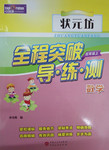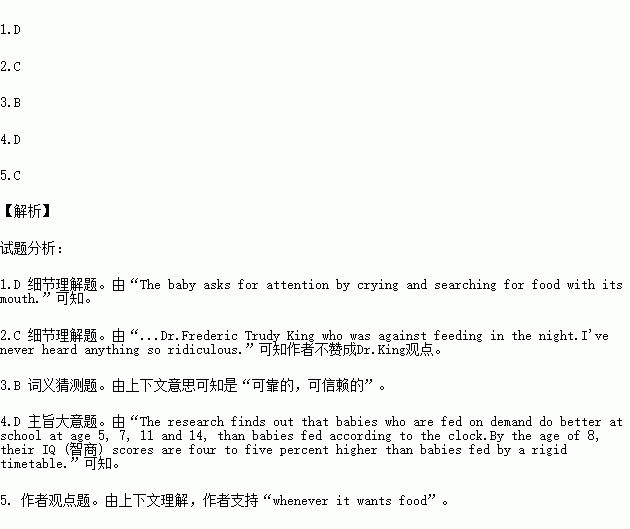题目内容
阅读理解
I have been consistently opposed to feeding a baby regularly. As a doctor, mother and scientist in child development I believe there is nothing to recommend it, from the baby's point of view.
Mothers, doctors and nurse alike have no idea of where a baby's blood sugar level lies. All we know is that a low level is harmful to brain development and makes a baby easily annoyed. In this state, the baby is difficult to calm down and sleep is impossible. The baby asks for attention by crying and searching for food with its mouth.
It is not just unkind but also dangerous to say a fourhourly feeding schedule will make a baby satisfied. The first of the experts to advocate a strict clockwatching schedule was Dr.Frederic Truby King who was against feeding in the night. I've never heard anything so ridiculous. Baby feeding shouldn't follow a timetable set by the mum. What is important is feeding a baby in the best way, though it may cause some inconvenience in the first few weeks.
Well, at last we have copperbottomed research that supports demand feeding and points out the weaknesses of strictly timed feeding. The research finds out that babies who are fed on demand do better at school at age 5, 7, 11 and 14, than babies fed according to the clock. By the age of 8, their IQ (智商) scores are four to five percent higher than babies fed by a rigid timetable. This research comes from Oxford and Essex University using a sample (样本) of 10,419 children born in the early 1990s, taking account of parental education, family income, a child's sex and age, the mother's health and feeding style. These results don't surprise me. Feeding according to schedule runs the risk of harming the rapidly growing brain by taking no account of sinking blood sugar levels.
I hope this research will put an end to advocating strictly timed baby feeding practices.
1.According to Paragraph 2, one reason why a baby cries is that it feels ________.
A.sick B.upset
C.sleepy D.hungry
2.What does the author think about Dr.King?
A.He is strict.
B.He is unkind.
C.He has the wrong idea.
D.He sets a timetable for mothers.
3.The word copperbottomed in Paragraph 4 is closest in meaning to ________.
A.basic B.reliable
C.surprising D.interesting
4.What does the research tell us about feeding a baby on demand?
A.The baby will sleep well.
B.The baby will have its brain harmed.
C.The baby will have a low blood sugar level.
D.The baby will grow to be wiser by the age of 8.
5.The author supports feeding the baby ________.
A.in the night
B.every four hours
C.whenever it wants food
D.according to its blood sugar level
 状元坊全程突破导练测系列答案
状元坊全程突破导练测系列答案

 in. Have you ever wanted to know why some people like very loud music? They must like to feel the sounds of music.
in. Have you ever wanted to know why some people like very loud music? They must like to feel the sounds of music. , it is n
, it is n
 e some things to touch. Their signs say, “Do touch! There you can feel everything on show. If you want to see better, reach out and touch. Then you’ll really see!”
e some things to touch. Their signs say, “Do touch! There you can feel everything on show. If you want to see better, reach out and touch. Then you’ll really see!”